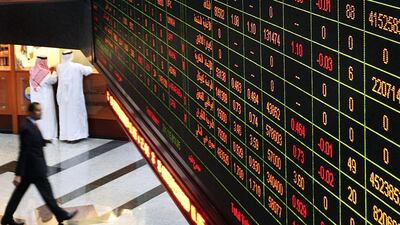After a stellar first quarter for UAE stocks, traders and investors say that future initial public offerings will test the appetite for equity markets.
The Abu Dhabi Securities Exchange General Index jumped 14.0 per cent in the period ended yesterday to close at 4,894.42 points.
The Dubai Financial Market General Index surged 32.0 per cent over the same period to close at 4,451.00 points.
“It was a strong quarter in terms of performance on the indices,” said Mohammed Ali Yasin, the managing director at National Bank of Abu Dhabi’s brokerage arm. “It was a continuation of the momentum we saw last year and the distributions from companies were very strong in terms of cash dividends encouraging investors.”
The next period will kick off earnings season and two high-profile public share sales in Dubai.
"Investors will be waiting for companies to confirm the fundamentals to justify the share price gains over the first quarter," Mr Yasin said. "Banks will probably lead the way followed by real estate, with good numbers from Dubai's Emaar Properties and Abu Dhabi-based Aldar Properties. It will give us good ammunition to keep this going in the second quarter."
Analysts expect the retailer Marka to list on the DFM after the company's founders subscribed to 225 million shares.
That works out to 45 per cent of the company’s planned float. The rest of the shares will be sold publicly.
In June, Emaar's retail unit is expected to list on the Nasdaq Dubai exchange. The IPO could be valued at up to Dh9 billion. The developer announced its intention to spin off the retail portion last month amid plans to redistribute some of the money raised as cash dividends and bonus shares to its investor pool.
“Marka is a small IPO so it won’t be a challenge. I wouldn’t be surprised if it’s 10 times oversubscribed,” Mr Yasin said.
"But the major test for the market is Emaar's mall spin-off. I am sure it will have a slowing effect on the secondary market. Pulling out D9bn at once by one company could suck liquidity out anywhere from three to six months."
A comparable IPO on the same exchange would be DP World when it went public in 2007. It was the largest share-sale in the Middle East at the time, raising nearly US$5bn. The company was valued at about $21.6bn.
Nasdaq Dubai does not attract the same kind of liquidity as its peer, the DFM. With few names and currency denomination in dollars, the exchange scares retail investors away from trading stocks such as DP World and the interior fit-out company Depa.
The struggle for trading volumes encouraged DP World to seek a secondary listing in London in 2011. Depa in March last year was reported to have been considering a departure from the exchange as a result of poor trading activity.
“It is a risk,” said Sebastien Henin, the head of asset management at The National Investor in Abu Dhabi. “Liquidity could be an issue, and maybe they can find a way to tackle this by introducing the UAE currency or reducing the nominal value of the shares. The appetite might not be the same in terms of attracting retail investors compared with if it decided to list on the Dubai Financial Market in UAE dirhams.”
UAE stocks are set for inclusion into MSCI’s emerging markets index in May. The benchmark by the index compiler tracks $7.3 trillion in equities around the world.
“We know for a fact that there is billions of dollars coming to the market with the impending MSCI inclusion,” Mr Henin said. “The Emaar listing is unique, where investors have few opportunities from a risk-reward profile to grab a slice of the retail story in Dubai.”
halsayegh@thenational.ae
Follow us on Twitter @Ind_Insights

